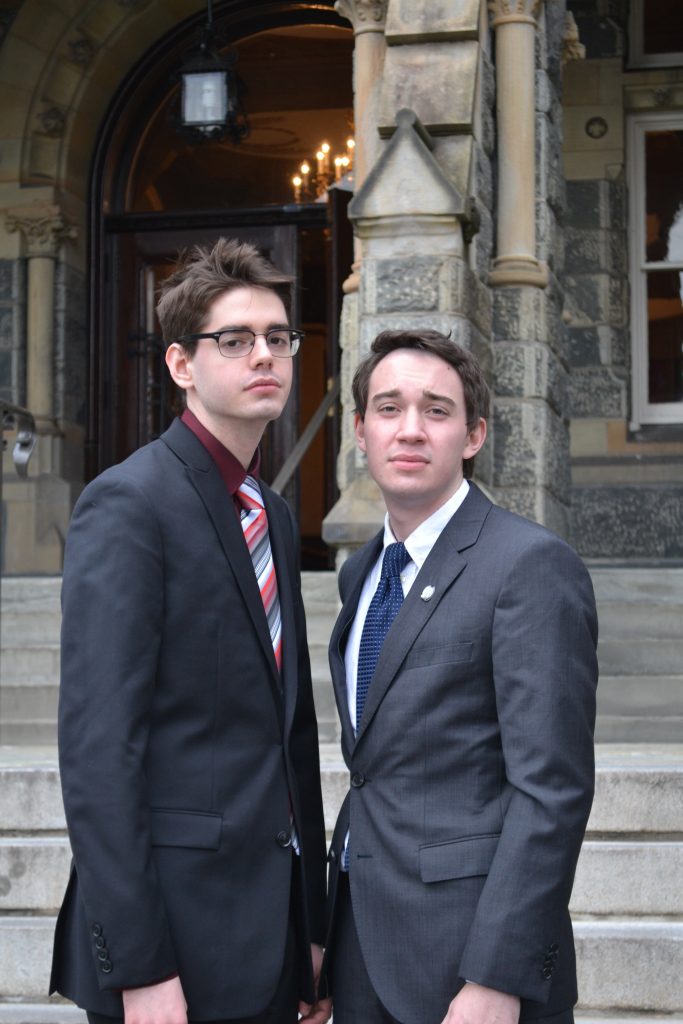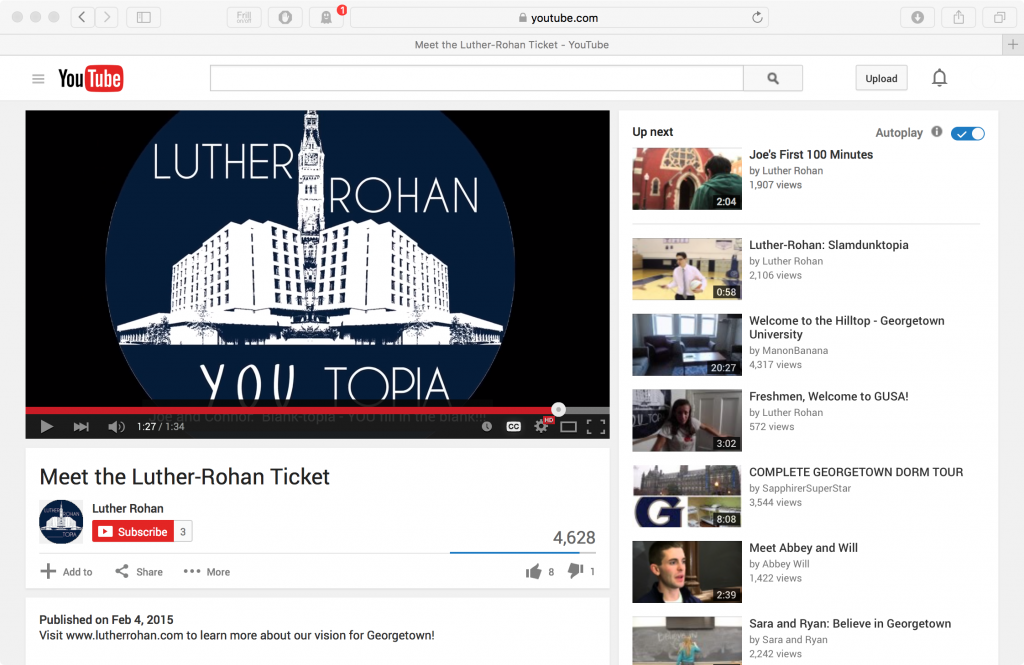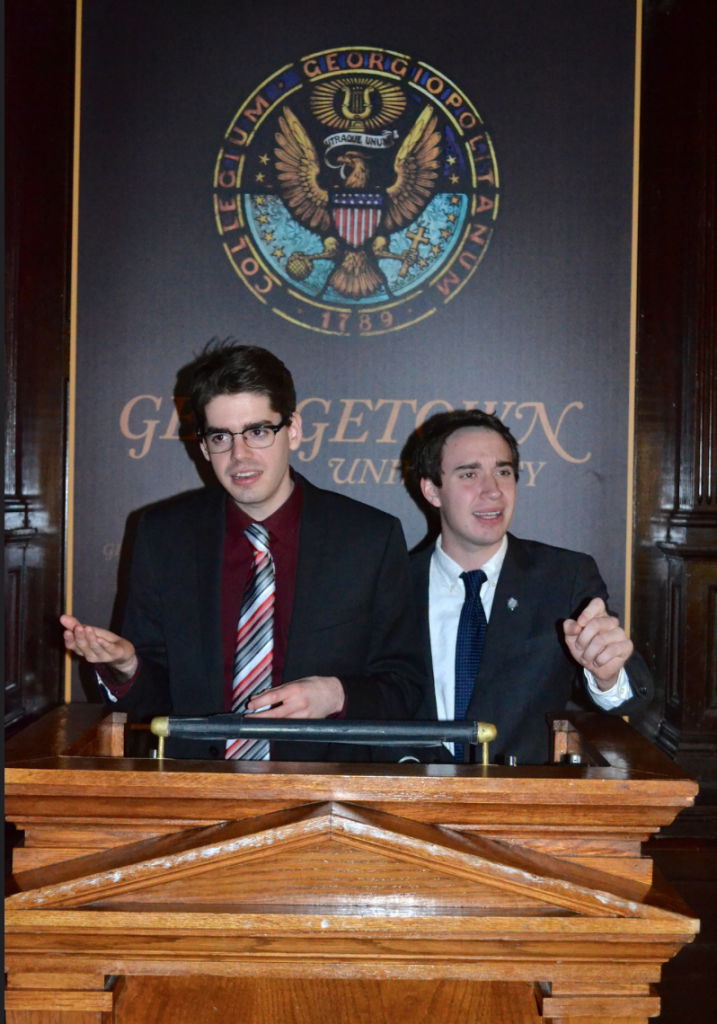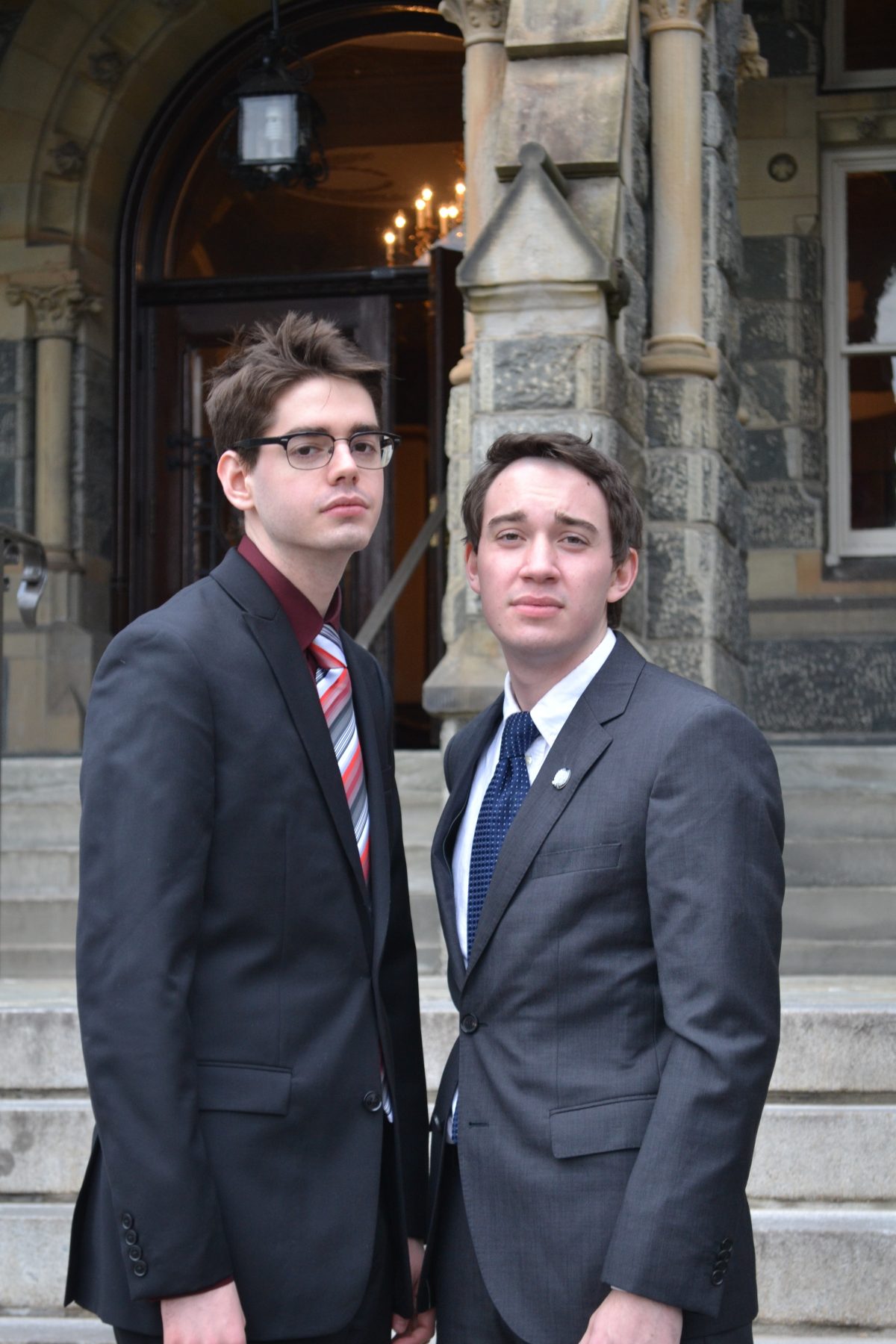
Luther and Rohan became GUSA insiders overnight after winning a joke campaign in the Spring 2015 GUSA elections. PHOTO: Andrew Sullivan
It started with the campaign video. Two young men in suits smile for the camera over patriotic music. “My name is Joe Luther,” one begins. “And my name is Connor Rohan,” says another. “And we are running for GUSA President and Vice President.”
The Luther-Rohan ticket began entirely as a joke. “A Luther-Rohan administration would end this living nightmare that we call home,” Rohan says in the video, posted in February. “We’re going to make Georgetown perfect, and you’ll never ever have a problem again. Ever.” [Full disclosure: Connor Rohan is a former Voice staffer.]
Joe Luther (COL ’16) and Connor Rohan (COL ’16) were then the Editor-in-Chief and Managing Editor of the Georgetown Heckler, a satire website targeted at the Georgetown campus. “The objective was to go in and basically be the Heckler in person, in the flesh, up there on the debate stage,” said Luther. They campaigned on terminating the fencing team, the emergency steam whistle, and Georgetown’s “bone-chilling necropolis,” the Jesuit graveyard. “We’re here to annihilate anything you don’t like,” says Rohan in the video.
Eager and beaming, the Luther-Rohan ticket highlighted and satirized everything GUSA executive campaigns had become for the student body: self-important competitors, opaque organization, and empty promises. The two snowballed in popularity. They made more videos, a website, and a kissing booth in Lau. Their critique of inane GUSA politics resonated with many students. At no point was it ever serious. “Absolutely not,” says Rohan today.
At some point things got ahead of them. “We’re improvisers,” Rohan said. “And in improv, what we’re supposed to do is play to the top of our intelligence, which essentially means, if you don’t know something, pretend like you do and act like you do … We’d go into interviews with The Hoya and the Voice and think ‘We’re gonna f*cking bomb.’ And we’d just spin things. We’d just talk.”
“And people would eat it up,” said Luther. “A lot of people believed in what we were campaigning on, which was not the objective at all.” Student support was growing. After the vice-presidential debate, they knew they couldn’t go back. “I wanted to drop out at that point,” said Rohan. “I thought, ‘F*ck, we f*cked up. We’re too far in.’ And I couldn’t. There was no alternative.”
They had no plan and no budget. Neither had ever been a part of GUSA. But they gained The Hoya’s and the Voice’s endorsements. The apathetic voting block became their asset. An FAQ on their Facebook page asks, “If I don’t give a shit, can I still vote?” Answer: “Yes, and you are our most important demographic.”
And then they won.
“I was terrified,” said Rohan. “It became real when we won.” They saw themselves as hard workers. They had no choice but to take these jobs they never wanted and do them to the best of their abilities. “Neither of us are going to half-ass anything we do,” Rohan said. “On the night we won I said, ‘It’s unbelievable the Georgetown community could elect two people with no platform and no budget. And you’re really lucky it’s me and Joe because if it weren’t, you might be f*cked.’”
Far behind every other candidate, the pair had to quickly catch up to figure out what exactly was going on at Georgetown, which mostly meant meetings. “When Connor and I first started this job, we didn’t have time to go to the bathroom,” said Luther, laughing. “Remember when we kept going from meeting to meeting having to pee?”
“We had to understand the nuances of the issue before we could develop tangible action. And we had to consult with relevant stakeholders,” said Rohan. “We had interviews with over 120 people and we met with every single one of them. And we made our decisions [for the cabinet] from there.”
The two came in with no initiatives and had to develop them later, when they became entrenched in the issues. Luther said administrators appeared to be surprised they were actually doing their jobs. To help out, they staffed their cabinet with those they thought were intelligent and competent. Former competitors Abbey McNaughton (COL ‘16) and Will Simons (COL ‘16) are their chief of staff and communications director, respectively.

The video that started it all.
McNaughton, who was involved in GUSA before taking the position, has had a stronger role in policy-making than previous chief of staffs. “I was very honored,” McNaughton said. “You can see that their concerns, their work, their efforts are very genuine, and I think that that makes it easy to work with them.”
Today, seven months later, Luther and Rohan are still in the executive chair and GUSA continues to function. They appear like any other student leaders, though a bit more eccentric. Rohan is fidgety and energetic. He’ll sit, then stand, then sit down again, finally settling for his feet on the table. He speaks in quick and loud bursts of thought. Luther is more tranquil and doesn’t swear quite as much. He introduces himself with his horoscope.
However odd they appear, Luther and Rohan know the issues now. They know the players in the game. They can eloquently list off their accomplishments to the media because they’ve had to many times. According to Rohan, they’ve succeeded in implementing the three tenets of their “Let’s Not Get Screwed Again” campaign: prioritizing maintenance, student input, and off-campus living in campus master planning. They have increased the number of students on the Georgetown Community Partnership Steering Committee from one to three and have worked on housing studies to strategize maintenance issues on campus. Additionally, because of their efforts, the new campus plan is not set to increase the number of students required to live on campus.
The pair has also made progress on mental health and sexual assault issues, which they have always been careful to treat sensitively. “The topic Joe and Connor were never joking about was mental health and student well-being, and I respected that,” said Todd Olson, Vice-President of Student Affairs. The two signed a Memorandum of Understanding in September, which committed the administration to reforming sexual assault policies.
The pair has also developed the Mental Health Open Forum, which took place earlier this month, and a mental health focus group of students. The group will work with Counseling and Psychiatric Services to make recommendations to university administration.
According to Rohan, their leadership has increased gender parity within the student government and worked to involve cultural groups often left out of GUSA workings.
Still there are difficulties. “There are roadblocks in every issue. A lot of them are financial,” said Rohan. They mentioned the slow-moving nature of Georgetown bureaucracy. “There are some meetings where we’re waiting months in advance to get an answer on something,” he continued. GUSA’s still potent reputation can also be damaging. Luther says the organization of the group baffles him. “There’s no power in GUSA, but we have separation of powers. What the Senate does, what their committees work on, is the same thing we have secretaries for.”
“What we’ve learned a lot is that it’s about persistency,” said McNaughton. “Just because you are not seeing big tangible outcomes doesn’t mean things aren’t changing or you’re not making an impact that will affect a lot of students.”
The roadblock that makes Luther and Rohan the most anxious, though, is student engagement and transparency. “I think that we have good policy underneath our belts. But … we want people to care about GUSA and what it does or should do. And they don’t,” said Rohan. “And that’s the fault of just a ton of baggage that the organization has. And it’s our fault for not focusing on that aspect as much as we should.”
After their win, the two emphasized engagement and transparency over all else. “A lot of people do not like GUSA,” they wrote in a March op-ed to The Hoya. “We understand that because we used to be the loudest among those ranks. But now we are GUSA. Now we have the unique ability to transform the culture of this institution.” They proposed a grassroots approach to administration, driven by student voices. They critiqued “GUSA’s failure to inform, engage, and inspire the student body in the past.”

PHOTO: Andrew Sullivan
The Luther-Rohan administration was supposed to reanimate GUSA’s culture and reputation, and imbibe the organization with humor, transparency, and student voices. According to both Luther and Rohan, this has been one of their administration’s biggest disappointments.
“We’ve done really well as GUSA President and Vice President,” said Rohan. “We haven’t done really well as Joe and Connor.”
After the campaign, the two lost the time they had been spending on image building and student engagement. “We were thinking of very creative ways to engage people and make them laugh… Now we are spending our time doing what is the typical GUSA mold,” said Luther.
By their own admission, Luther and Rohan are not the joke candidates anymore. They are an effective GUSA President and Vice President pair only in the ways other administrations were before them. “I don’t like it,” said Rohan. “People elected us. We’re no longer those people. Now we are what people didn’t want. We are now the people that people didn’t elect.”
“It’s one thing to be shouting from the back row hilarious jokes,” said Luther. “It’s another to be at the stage.”
Since the election, the two have outsourced communications to their team. Craig Levites (COL ‘17), current Editor-in-Chief of the Georgetown Heckler, is their “Minister of Fun,” in charge of incorporating humor into communications. While Luther and Rohan emphasize that the communications team has done a great job, they say the tone has somewhat evaporated.
“In the long term I don’t think we’ve done a whole lot to change what GUSA is and how it communicates,” said Luther. “GUSA still kind of has that ‘GUSA sheen’ to it … We haven’t translated what we did during the campaign to what GUSA is as a whole.”
At some point, Luther and Rohan became so entrenched in learning the business and completing the duties of the GUSA executive, they left behind what got them elected.
“There are so many expectations on what we should be doing,” said Rohan. “And we have adhered to them. We’ve adhered to them very well. But I think it’s our job at this point to break out of those expectations because I think that they’re harmful to the larger organization … We became so caught up in actually learning the institution of Georgetown and the institution of GUSA that we became absorbed in it … We have the autonomy to really do what we want and we don’t have to be like they were in the past.”
The two are working on delegating responsibilities to free up time and hopefully making progress on engagement. “The little victories, the little changes, the little policy shifts, attitude shifts, those kinds of things that take a lot of effort to get done, are not things people might notice every day,” said McNaughton. “It comes off like GUSA isn’t as involved because it’s not as visible. And I think that’s something that Joe and Connor and I really want to focus on in the second half of the term, making sure that people feel a stronger relationship to GUSA than they have in the past.”
“One of the most powerful things we can do is make people care again,” said Rohan. “We said we were going to do that and we didn’t.”
Luther and Rohan have until March to do what they said they would. Even though their YOUtopia was satire, it was one many students wanted to believe in. It was something the pair began to take seriously after the election. “A bottom-up approach, driven by people and not foreordained policy, is what GUSA needs to be truly representative and inclusive for all students,” they wrote in their March op-ed. “The success of this project is not guaranteed.”
This article was originally published in the Oct. 23, 2015 issue.






“A lot of people believed in what we were campaigning on, which was not the objective at all.”
Nobody, NOBODY believed in what they were campaigning on. What people believed in then, and do now, is what a joke GUSA is and that it is so irrelevant to student life that a joke ticket wouldn’t be any worse than than a real one.
There wasn’t anything to believe in. That said, I don’t think people would have voted at all if they were as apathetic as you imply. I think they were mobilized- to express agreement with J+C’s satire about GUSA, and perhaps even felt that the “common sense/average person ticket” as J+C’s grassroots approach was, would be more successful than the typical career GUSA candidates.
Tl;Dr: They weren’t campaigning on anything, but people believed in them anyway.